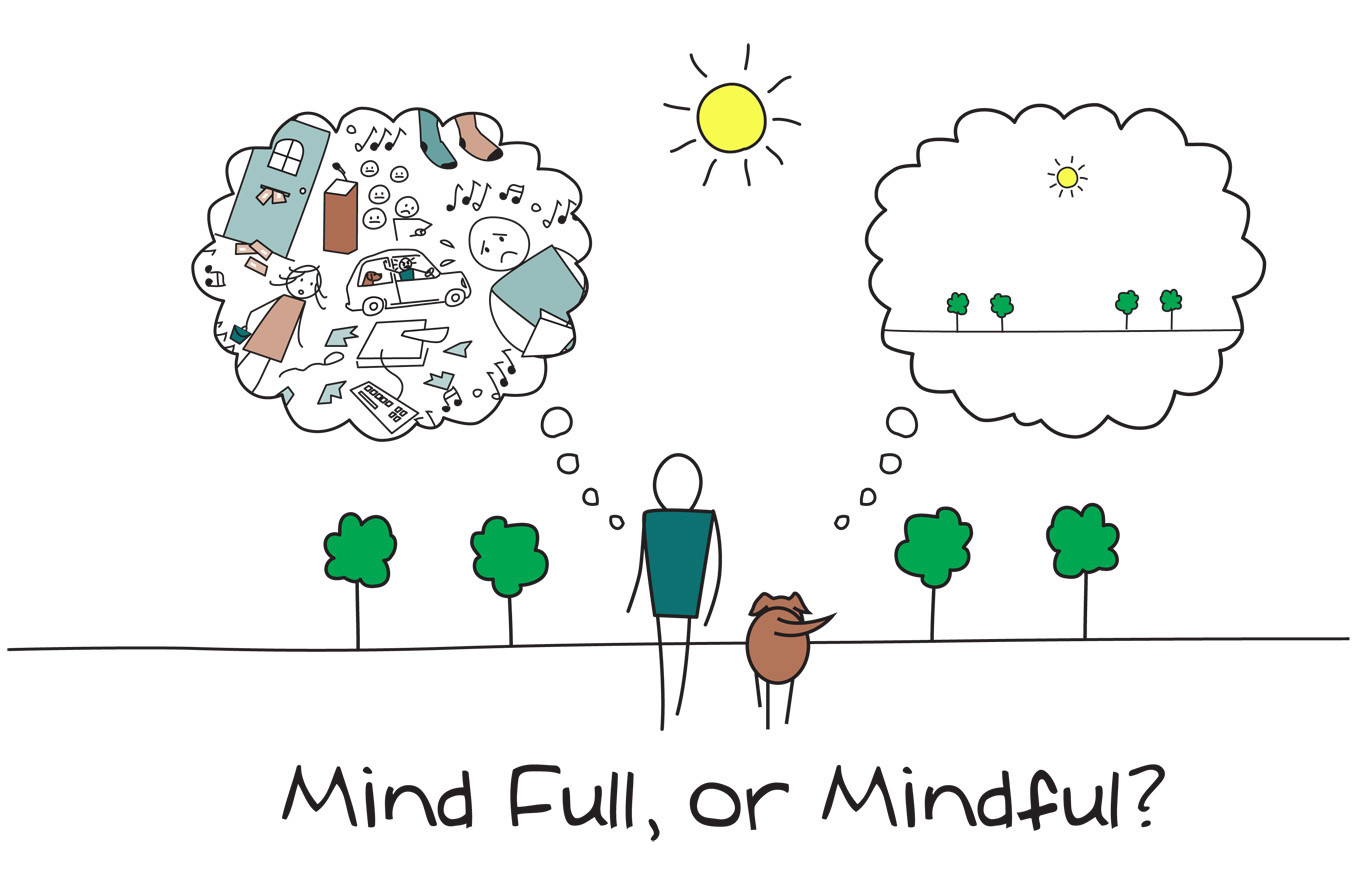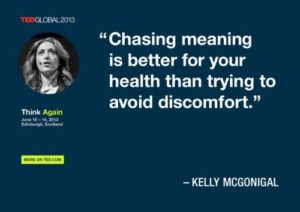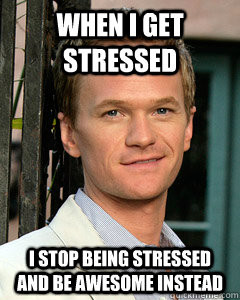Before the internet rains flaming shit down on me for that title, i’ll quickly state that I have a confession to make — I’m a stress junkie, I’m addicted to it, the same way I’m addicted to exercise, eating broccoli and practicing mindfulness.
Reducing stress sounds like it should be a good thing, right? Hasn’t stress been proven to cause all sorts of life threatening illnesses, from heart problems to obesity to cancer? Well, not exactly.
By trying to “reduce” stress we are making stress the enemy, implying that less stress is good and more stress is bad, when it’s not stress that is bad for us, but the “belief that stress is bad for you”. In a TED Talk by Kelly McGonigal (below), she demonstrates the science behind that statement. In a nutshell, for those of you that haven’t seen the video or choose not to watch it now (which I highly recommend you do, even if you’ve seen it before), Kelly illustrates that stress causes death, but only for those who believe that stress is bad for them. Actually, people with a lot of stress, but that believe that stress is helpful, were less likely to die than people who only had a little amount of stress. Crazy, but true.
So if you seek out a professional to help you with your stress, where are they likely to point you? Most likely to a Mindfulness-Based Stress Reduction Program. Mindfulness became popularized in the west due to the work of Jon Kabat-Zinn, and his development of MBSR (Mindfulness Based Stress Reduction). We have MBSR to thank for bringing the benefits of mindfulness to the masses. Jon took an eastern concept mired in spiritual confusion and made it practical for the layman. The issue I have with MBSR is the name, not the MB, I highly endorse mindfulness-based pretty much anything. From Mindfulness-Based Coaching and Psychotherapy (which help the client stay aware of and experience their current state rather than just talk about it) to Mindfulness-Based Eating (chewing on a single raisin for half of eternity) to Mindfulness-Based Pooping (sitting on the toilet without a wifi connection, and noticing the smell for the first time). Joking aside, there is a deadly result due to the last two letters of the acronym – SR. “Stress Reduction”, while in 1979 when Jon created it, was a novel concept, today is not only outdated but downright dangerous.

The popularization of the term MBSR then, causing people to believe that stress is bad for them, is actually killing people (though possibly only the people that don’t actually practice MBSR). It wouldn’t be the first time that noble intentions led to a lethal outcome. Another example would be putting a law in place to make all cigarette cartons bear a disgusting image of the effects of long term smoking, from rotten lungs and gums to dying on a deathbed. In theory this was supposed to deter people from smoking, but what happened was that people saw the image and felt terrible about smoking, so they smoked more to try to get rid of that terrible feeling.
MBSR is certainly not the only reason that people have come to believe stress is harmful to their health, and it’s possible that MBSR has saved more lives than caused deaths, though I’ll wait for the science to determine that outcome, as there are a lot more people who believe that stress is bad for them than people who (properly) practice MBSR.
 This is not a blame game, it’s a call to update our beliefs based on the science. As Kelly McGonigal states, “the latest science reveals that stress can make you smarter, stronger, and more successful. It helps you learn and grow. It can even inspire courage and compassion,” but only if you believe that to be true. Sounds too awesome to be true!
This is not a blame game, it’s a call to update our beliefs based on the science. As Kelly McGonigal states, “the latest science reveals that stress can make you smarter, stronger, and more successful. It helps you learn and grow. It can even inspire courage and compassion,” but only if you believe that to be true. Sounds too awesome to be true!
I applaud Jon Kabat-Zinn and all those with noble intentions who have naively made stress the enemy, for without them we would not be having this conversation. The problem is that this negative belief is now so pervasive, most of the professionals out there trying to help people with their stress are spreading the pandemic even further, and accidentally making it more likely their patients will die. Anytime you hear someone, especially those with medical credentials, say they can help you reduce your stress, run the other way. Actually no, that would be living in fear, instead do the opposite, have the courage to step up, contradict them and show them the evidence so that they might stop spreading this pandemic of false beliefs.You don’t need to reduce your stress, you need to get better at stress. You need to make stress your friend, but how can you change an enemy into a friend when there’s so much historical baggage and you have so many negative feelings towards this enemy?
When I run stress management workshops I always show Kelly’s video, but before the video I ask, “who here believes stress is bad for you?” Before the video a majority of the people raise their hands. After they have seen the video, and I ask the same question something interesting happens. I found that men typically don’t raise their hand, implying that either the facts shown in the video were enough to convince them that the stress response is helpful (possible, though unlikely) or their egos won’t allow them to admit to believing something that has been proven false. However, generally with women, I was astonished to find that their response before and after the video remained virtually unchanged, so the facts definitely weren’t enough to convince them.
I’m faced with this problem in virtually every coaching session, when people are aware they should be doing, thinking or believing something different, but they are so stuck in their ways they are not quite sure how to change.
Are your Beliefs about Stress Killing you?
So what is your current belief? Do you believe stress is bad for you? Now that you know the facts, would you like to change that belief?
 Unfortunately for most people it’s not just a matter of being shown the facts, if that were the case no-one would be afraid of getting eaten by sharks (as they cause only 5 deaths a year globally), no-one would smoke cigarettes (as they cause 5 million deaths annually) and sure as hell no-one would believe stress is bad for them (that belief kills 20,000 people annually in the US alone). But we still do all these things, why? We aren’t very good at taking action based on facts, we’re much more likely if we hear a story that resonates with us, and most likely if we have personal experience.
Unfortunately for most people it’s not just a matter of being shown the facts, if that were the case no-one would be afraid of getting eaten by sharks (as they cause only 5 deaths a year globally), no-one would smoke cigarettes (as they cause 5 million deaths annually) and sure as hell no-one would believe stress is bad for them (that belief kills 20,000 people annually in the US alone). But we still do all these things, why? We aren’t very good at taking action based on facts, we’re much more likely if we hear a story that resonates with us, and most likely if we have personal experience.
Here’s a terribly oversimplified example to help you understand what I mean:
Fact:
If I tell you that 3.1 million children die every year from starvation, are you going to do anything about it? Unlikely.
Story:
If I tell you that there is a family of 10 children whose parents died last week and they have no money and are about to die if they don’t get food to eat today, would you do anything about it? Maybe.
Personal Experience:
If you almost died of starvation as a child and someone saved you, and you find an orphan on the street dying of starvation, are you going to do anything to help? Most definitely.
Stories trump facts and personal experience trumps stories; that’s how the human brain is wired. The brain resists change, as for us to change requires that we build new neural networks and that requires more energy and effort than simply staying the same. Beliefs are built around experience, and thus for you to change your beliefs it often requires personal experience that confirms the new belief.
How to change your beliefs about stress in 4 easy steps:
Step 1 – Become mindfully aware of how you experience stress
 Here are some questions to ask yourself to begin to better understand how you experience stress. But before you read them, notice first if you feel stressed right now, and if not, think of a time when you did feel stressed or think of something that triggers you to feel stress so that you can discover the details of how you experience stress in the present moment.
Here are some questions to ask yourself to begin to better understand how you experience stress. But before you read them, notice first if you feel stressed right now, and if not, think of a time when you did feel stressed or think of something that triggers you to feel stress so that you can discover the details of how you experience stress in the present moment.
Now that you are feeling stressed (this exercise is fairly useless if you are not – remember it must be experiential), what is your physical experience of stress?
- Does your heart beat faster? Palms sweat? Body heat up?
- Do you have any pains or discomfort? In your back or neck or head? Does your stomach tighten?
- How long does the sensation last? Does it move, intensify or weaken?
Whatever the sensation, just stay with that, let it be there, without judging it as good or bad, just being aware of what it feels like. Allow yourself the time to become familiar with the intimate details of your stress response, without prescribing any meaning to it. Take your time to let yourself stay with that feeling. Once you feel like you have a good representation of your stress response, read on.
This is where mindfulness has its limitations, just being aware of how you respond to stress doesn’t necessarily change what you believe about stress. If you decide to become a Buddhist monk and go live in an isolated environment high up in the mountains, it may be enough, but that is giving up on society, on this world. We need people in the real world to help the real world thrive, not just to cease their own personal suffering. So for you to actually change your belief about stress instead of just reduce or avoid it, you will need to personally experience stress being helpful to you.
Step 2 – Personally experience stress being useful to you
 There is only one way to do this – to experience it in the present moment. But before you run off trying to get into stressful situations and love them, there are ways you can practice to make it easier. once you get into a stressful situation, it triggers certain neural pathways in your brain, and once they have been triggered, you will “almost” instantaneously begin to feel stressed. the emphasis is on “almost”. You actually have a fraction of a second to choose your reaction, but it feels instantaneous because you’ve been doing it so long you’re a pro at it.This is where mindfulness comes in handy. Once you become mindfully aware of how you begin to feel stressed, as soon as you begin to feel that you can pause, to let it in and “ride the wave” instead of letting it crash down on your head.
There is only one way to do this – to experience it in the present moment. But before you run off trying to get into stressful situations and love them, there are ways you can practice to make it easier. once you get into a stressful situation, it triggers certain neural pathways in your brain, and once they have been triggered, you will “almost” instantaneously begin to feel stressed. the emphasis is on “almost”. You actually have a fraction of a second to choose your reaction, but it feels instantaneous because you’ve been doing it so long you’re a pro at it.This is where mindfulness comes in handy. Once you become mindfully aware of how you begin to feel stressed, as soon as you begin to feel that you can pause, to let it in and “ride the wave” instead of letting it crash down on your head.
But doing this in the “real world” when there are “real world” things at stake is easier said than done, so you may need to practice before you play this game in the “real world” leagues. Here are 3 ways to practice that I often use with coaching clients:
MEMORY+:
Remember a time when you felt stressed and the outcome was positive. Immerse yourself in the memory of what it felt like to be stressed at that time.
Take your time to really get back into that situation, where you were, who was there, how you were feeling… And begin to notice how by being in that state you were able to achieve a positive outcome.
SHOOTING-BLANKS:
Put yourself in some situations that generally make you feel slightly stressed. Straddle the line being doing the activity and not doing it and notice the stress response beginning. Take your time and choose to use your stress to help you overcome that situation. Once you find that easy, move on to a more challenging situation.
Step 3 – Do it again and again and again…
 Until your new “Stress is Awesome” brain re-wiring is solidified and strengthened and it becomes your natural response to a “so-called” stressful event. We could even come up with a new word to trick your brain into thinking it’s a whole new activity for it to enjoy – try “AweStress” on for size! Practice AweStress in as many situations, contexts and environments as you can so that your new beliefs become bulletproof. Begin saying things like, “I had so much to do today I was so Awestressed, and I felt so pumped I loved it!” And when people ask you what the hell you are talking about and what drugs you’ve been taking, move to Step 4.
Until your new “Stress is Awesome” brain re-wiring is solidified and strengthened and it becomes your natural response to a “so-called” stressful event. We could even come up with a new word to trick your brain into thinking it’s a whole new activity for it to enjoy – try “AweStress” on for size! Practice AweStress in as many situations, contexts and environments as you can so that your new beliefs become bulletproof. Begin saying things like, “I had so much to do today I was so Awestressed, and I felt so pumped I loved it!” And when people ask you what the hell you are talking about and what drugs you’ve been taking, move to Step 4.
Step 4 – Share this article with 6 of your closest friends and practice AweStress with them
So that you are surrounded by people who confirm your new healthy belief. Remember, you are a reflection of the 6 (or so) people you spend the most time with, so you need to make sure the people around you are supporting you to maintain and enforce your healthy beliefs, and share the article instead of just telling them about it, because without them going through the 4 Steps, they will not really believe you, i mean “are you CRAZY, Stress is Awesome? Don’t you know it kills people?! Are you saying it’s awesome to be a MURDERER?!?!” So make it easy on yourself, just share it. It will also help to tell each other stories of how your new belief turned out to be true, and push yourselves to get as AweStressed as possible together and notice how empowering it feels!
 Trying to reduce stress is like pulling the plug out the bottom of a boat and then using the plug to desperately try to bail the water out as it comes rushing in instead of just plugging the hole again (forehead slap). So stop fighting stress as an enemy, or you are still more likely to die than someone who has more stress than you and believes in AweStress. Update your beliefs, welcome your new friend AweStress into your life with open arms, mindfully embrace the challenges and growth opportunities that it brings and introduce your new-found friend AweStress to everyone you meet so we can spread this life saving vaccine to the rest of the world.
Trying to reduce stress is like pulling the plug out the bottom of a boat and then using the plug to desperately try to bail the water out as it comes rushing in instead of just plugging the hole again (forehead slap). So stop fighting stress as an enemy, or you are still more likely to die than someone who has more stress than you and believes in AweStress. Update your beliefs, welcome your new friend AweStress into your life with open arms, mindfully embrace the challenges and growth opportunities that it brings and introduce your new-found friend AweStress to everyone you meet so we can spread this life saving vaccine to the rest of the world.
Visit: fionnwright.com to book a free coaching session to learn to love stress!
